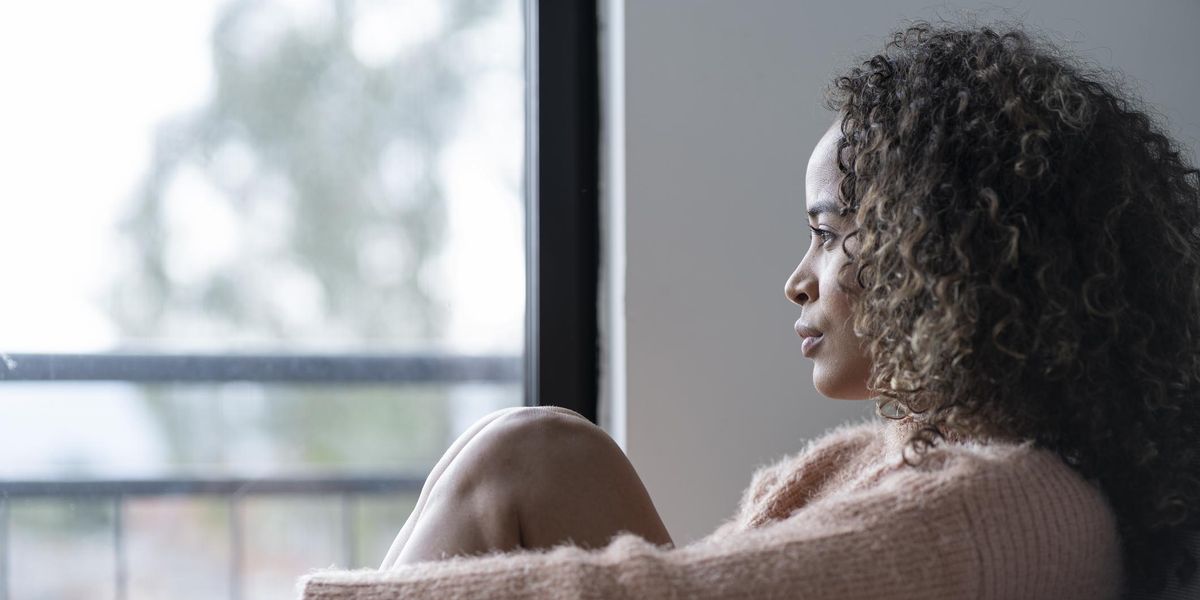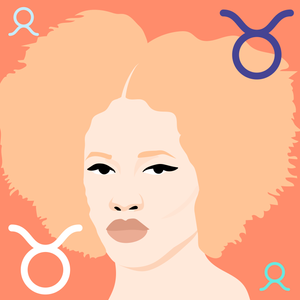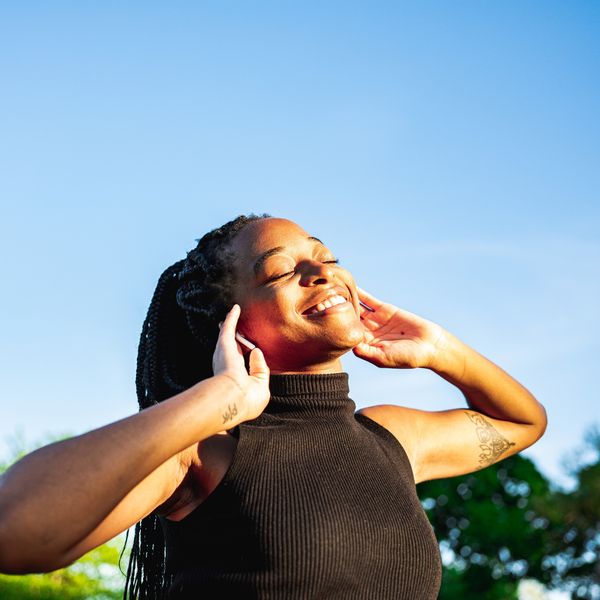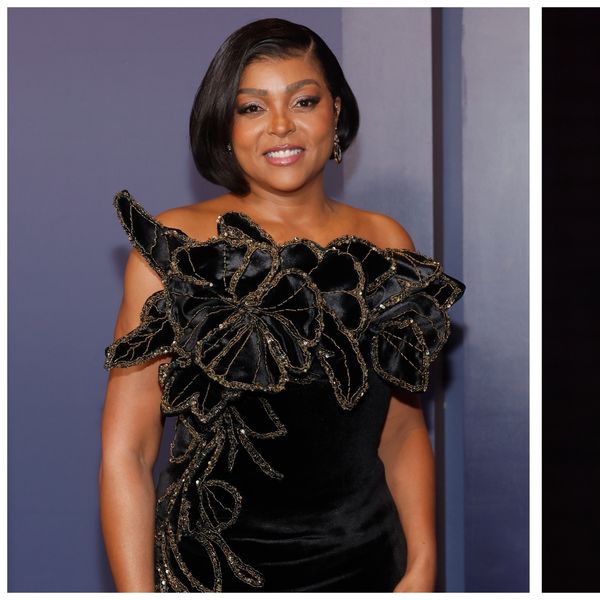
A Cancer Diagnosis Before I Turned 30 Taught Me The Importance Of Surrender
I've spent the past five years of my life learning to love myself and striving to be at peace. After being in a constant state of learning and unlearning, I was ready to breathe. I was ready to be free and live. So, when I was diagnosed with thyroid cancer last July, I didn't know how to feel.
In early 2019, I got a yeast infection that wouldn't go away for three months. After trying several over-the-counter remedies and being prescribed a few Diflucan pills, I stopped believing my problem was untreatable yeast. I went to a women's clinic that happened to perform routine thyroid ultrasound exams during their gynecological visits. They found a nodule on my thyroid during the ultrasound and referred me to the radiologist. The doctor told me thyroid nodules weren't uncommon, but I should visit the radiologist as a precaution. She looked slightly concerned and kept asking me if I felt a lump or pain in my neck, but I didn't. I also didn't think much of it because I didn't know anyone in my family with thyroid issues, and I was focused on treating the uncomfortable yeast that wouldn't go away.
The radiologist confirmed that there was a nodule on my thyroid—in fact, there were three. He requested that I get them biopsied and urged me to get my blood work done because he was worried my thyroid wasn't functioning correctly based on what he saw on the ultrasound. When my primary care physician reviewed my tests, she told me my thyroid levels were normal, but I was anemic. My body was running on its reserve iron levels, which had gotten dangerously low. My doctor put me on an iron treatment plan because I didn't have enough white blood cells to fight my yeast infection, even when I was on medication. With treatment, my yeast infection went away, and I felt great. Then my neck started hurting.
It was a dull pain that would shift from the left to the right side of my neck. I thought my years of sleeping without a pillow finally caught up to me, but the pain wasn't surface level. My doctor told me that I could have developed allergies, and the pain was likely due to swollen lymph nodes. The pain continued for the rest of the year, but I tried my best not to scare myself. I had a habit of assuming the worst-case scenario and driving myself into a panic. This time, I wanted to do things differently. My blood work was "normal," and the pain in my neck wasn't constant, so I told myself there was no need to fear the unknown.
But the pain in my neck returned and I was concerned. I called my doctor and told her I wanted to check on my thyroid. I couldn't shake the feeling that I was meant to visit that women's clinic and discover those nodules. Though my blood work showed normal thyroid hormone levels, I couldn't stop thinking about a woman who shared her cancer story on YouTube. Her labs also looked "normal" before she was rushed into emergency surgery a few weeks later.
So, when I went to the radiologist in July, and they confirmed I had cancer, I was sad, but I wasn't shocked. I was diagnosed with Metastatic Papillary Thyroid Carcinoma. For the first time in my life, I truly understood what the adults around me meant when they said, "If it ain't one thing, it's the other." The diagnosis explained my feelings of fatigue, inability to concentrate for long periods of time, low white blood cell count, and dull pain in my neck.
I'd go into exam rooms, and the doctors would share a lot of information and then try to comfort me by saying, "Of all the cancers to get, thyroid cancer is the best because it has a treatment plan!"
Or, "You're not going to die!"
Or, "You didn't do anything to end up with cancer. It's not your fault."
I never knew how to respond. Part of me felt guilty for being sad because of the constant reminders that my diagnosis could be worse. Part of me felt like my biggest fear of dying young was going to come true. The doctors would say their speech and wait for me to cry or ask questions, but I had nothing.
I was diagnosed with something I couldn't control, and I felt defeated.
For most of my life, I felt like if I was in control, bad things wouldn't happen. A few years ago, I realized trying to control everything was impossible, and trying to was making me unhappy. So, I started unlearning the harmful habits that kept me stuck in self-sabotaging patterns. I was focused on getting my life together and trying to improve the relationship I had with myself. I moved back to DC. I was making new friends. I was going out more and became more consistent with my writing. I was probably the most at peace I had ever been.
And then, I was presented with something I couldn't control, and I went numb. I googled everything, but I couldn't find it in me to research my diagnosis. I didn't want to overwhelm myself with information because I knew I couldn't change it. I couldn't fix it. I couldn't read, cry, vent, dance, talk, learn or journal my way out of cancer.
I tried to revert to my favorite habit of finding escapes, but it wasn't the same. Spending money I didn't have made me anxious. Having sex with men I don't like and who don't like me was underwhelming. Being drunk wasn't fun. It made me feel irresponsible, and it triggered migraines. I tried to fill the silence with random TV shows and YouTube, but the lack of quiet moments made me feel ungrounded. None of it was the same because I knew the only thing I could do that would ultimately make me feel better was surrender.
I've done everything to avoid writing about my diagnosis, and It's made me struggle to write anything for the past year. I'm not ashamed of having cancer and I don't feel sorry for myself. I know I didn't do anything wrong, and this isn't punishment from God for any "wrongdoings." But being sick is hard. Having a chronic illness is hard. Feeling like your body is betraying you at 30 is hard—I get anxious anytime I feel a random ache or pain.
I had surgery to remove my thyroid a few weeks after my 30th birthday last October. Since the cancer spread to a few of my lymph nodes, I had the infected ones removed as well and then had a radioactive iodine treatment (a form of radiation therapy) to remove any residual thyroid cells in January. Now that I don't have a thyroid, I take daily medication to prevent the cancer from returning and treat my hypothyroidism. I get my bloodwork done every few weeks to ensure my medication works and ultrasounds twice a year to monitor any growths in my neck.
It's an adjustment.
In her book When Things Fall Apart, Pema Chodron writes, "Things falling apart is a kind of testing and also a kind of healing. We think that the point is to pass the test or to overcome the problem, but the truth is that things don't really get solved. They come together and they fall apart. Then they come together again and fall apart again. It's just like that. The healing comes from letting there be room for all of this to happen: room for grief, for relief, for misery, for joy."
I think about those words every day. Things come together, and they fall apart. My life as a person without a chronic illness is over, but my life isn't over.
After my diagnosis, I promised myself I wouldn't stop going after the things I wanted in life. I've gotten a better job, added two great people to my friendship circle, developed some new creative outlets, had many fun nights dancing awkwardly in DC, and made many memories with dope people. Good things are happening. And every time they happen, I lean into them. Fully. When joy is present, I reach out and grab it. When grief is present, I try to let myself sit in it. I have to have faith that I can make it through the parts of life that will be beautiful and the parts of life that will be terrifying because this is what it means to live a full life.
Being diagnosed with cancer didn't give me any major life epiphanies. But it did make me value myself more and have a stronger desire to protect myself and care for my well-being. I try not to lament over things I can't control. I feel less inclined to spend time with people who don't make me feel seen and loved. I give less energy to thoughts, opinions, and beliefs that don't serve me. I'm more focused on living my life for myself and not for the approval of other people. The whole experience has made me more appreciative of life. I don't have everything I want in life, and my life isn't as I pictured it would be at 30, but I have a good life. And I'm grateful.
Each year an estimated 44,000 adults in the United States get diagnosed with thyroid cancer. Women are three times more likely to develop thyroid cancer than men, and those with cancer are likely to be diagnosed at a younger age. You know your body best. If you feel pain in your neck or anywhere in your body, get it checked out.
Let’s make things inbox official! Sign up for the xoNecole newsletter for daily love, wellness, career, and exclusive content delivered straight to your inbox.
Featured image by Mario Arango/Getty Images
ItGirl 100 Honors Black Women Who Create Culture & Put On For Their Cities
As they say, create the change you want to see in this world, besties. That’s why xoNecole linked up with Hyundai for the inaugural ItGirl 100 List, a celebration of 100 Genzennial women who aren’t afraid to pull up their own seats to the table. Across regions and industries, these women embody the essence of discovering self-value through purpose, honey! They're fierce, they’re ultra-creative, and we know they make their cities proud.
VIEW THE FULL ITGIRL 100 LIST HERE.
Don’t forget to also check out the ItGirl Directory, featuring 50 Black-woman-owned marketing and branding agencies, photographers and videographers, publicists, and more.
THE ITGIRL MEMO

I. An ItGirl puts on for her city and masters her self-worth through purpose.
II. An ItGirl celebrates all the things that make her unique.
III. An ItGirl empowers others to become the best versions of themselves.
IV. An ItGirl leads by example, inspiring others through her actions and integrity.
V. An ItGirl paves the way for authenticity and diversity in all aspects of life.
VI. An ItGirl uses the power of her voice to advocate for positive change in the world.
Let’s make things inbox official! Sign up for the xoNecole newsletter for daily love, wellness, career, and exclusive content delivered straight to your inbox.
Vivica A. Fox Gets Candid About Her Dating Life As Her 60th Birthday Approaches: ‘I’m Taking Applications’
Vivica A. Fox says she’s on the market!
During a recent appearance on Today with Hoda & Jenna, the Set It Off actress spoke candidly about her dating preferences amidst modern dating culture.
"I’m wanting to date, it’s just limited resources out there, right? Because I’m not getting on an app. I’m old-fashioned," Fox said. "I need to meet you and sparks happen because I just believe people make up stories, saying who and what they are."
The actress, 59, expressed her desire for a partner and isn’t shy about the traits she hopes her future soulmate will embody.
"When I say a partner, I want someone who’s going to be fun, who’s not intimidated by who and what I am, that likes to travel, and is gonna let me go shopping," she illustrates.
Fox continued, "I’m taking applications, so if you got a friend, I’m good. And I don’t discriminate. I’m not against different nationalities, so you can know that too. You gotta leave your options open."
With the Not Another Church Movie star’s 60-year-old birthday approaching this summer, Fox humorously reflects on how it feels to reach this milestone age. "Well, I'm not going to lie, my knees someday are like, ‘Let’s go get a little help there.’ Some shorts, or something. But I’m so comfortable in the skin I’m in."
Vivica A. Fox has had a notable dating history with high-profile relationships with rapper 50 Cent in the early 2000s and has been romantically linked to Dennis Rodman and was previously engaged to Omar "Slim" White.
Fox adds that she’s living her best “booked, busy, and blessed” life and is grateful for the fulfilling opportunities that have come to her in this chapter of her life.
"I never expected this chapter of my life to be so booked, busy, and blessed — literally in that order. I’m finally getting quality, I’m getting projects that I love doing," she says.
"I’m all about girl power and lately women have been giving me the most wonderful opportunities. ... The blessings have just kept growing, and finally, everyone’s giving me my flowers. It’s about time, and I’m taking them."
Let’s make things inbox official! Sign up for the xoNecole newsletter for love, wellness, career, and exclusive content delivered straight to your inbox.
Featured image by Carol Lee Rose/Getty Images









